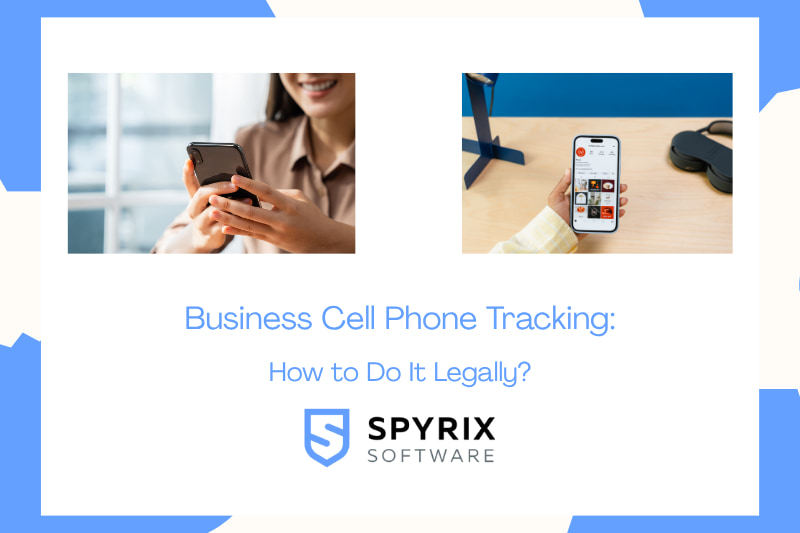Business Cell Phone Tracking: How to Do It Legally?
2025-05-30

In today's fast-developing business environment, it becomes challenging to track the team activities at the workplace. So, the ability to monitor company-owned devices including cell phones has become an essential tool for ensuring productivity, protecting sensitive data, and maintaining operational efficiency. However, with great technological power comes significant legal responsibility. Phone tracking for business aims brings numerous benefits such as location monitoring, usage analytics, and security safeguards. But how to meet the legal requirements that protect the employees rights for privacy? Whether you run a small business or are a head of a big enterprise, understanding how to navigate this complex landscape is critical to fostering trust and safeguarding your business interests. In this article, we’ll explore how to legally and ethically monitor business cell phone activity.
Why Businesses Use Cell Phone Tracking?
Cell phone tracking has become an increasingly common practice in the business world. It is driven by the need to enhance operational efficiency, ensure security, and optimize resource management. here are the common reasons to organize monitoring practice in the office:
| Reason | Explanation | |
|---|---|---|
| Improving employee productivity | Monitoring app usage, call logs, and location data helps identify inefficiencies and ensure employees focus on work-related tasks. | |
| Enhancing real-time location of the devices | Real-time tracking of employee locations enables optimized routing, timely deliveries, and better coordination of field operations. | |
| Protecting sensitive data | Tracking company-issued devices prevents unauthorized access, detects potential leakages, and allows remote cleaning of sensitive information. | |
| Ensuring workplace safety | In dangerous or remote environments, tracking ensures quick response to emergencies and compliance with safety protocols. | |
| Preventing unauthorized use | Monitoring the use of a mobile device helps define whether there are excessive personal calls, non-work apps, or unauthorized downloads. | |
| Reducing operational costs | Spotting unnecessary expenses helps optimize mobile payment plans and reduce costs. | |
| Deterring theft and fraud | Tracking prevents theft, allowing businesses to quickly find the stolen or misused devices. Additionally, it ensures to minimize financial losses and safeguard assets. |
| Law/Regulation | Description | Key Implications for Businesses |
|---|---|---|
| Electronic Communications Privacy Act (ECPA), 1986 | A federal law regulating the interception and monitoring of electronic communications, including phone calls, emails, and location data. |
|
| Stored Communications Act (SCA) | Part of the ECPA, this act prohibits unauthorized access to stored electronic communications, such as text messages or emails. |
|
| State-Specific Laws | Some states have enacted stricter privacy laws that impose additional requirements beyond federal regulations. | Businesses operating in these states must comply with both federal and state-specific laws. |
| California Consumer Privacy Act (CCPA) | Grants employees certain rights over their personal data, even on company devices. |
|
| Biometric Information Privacy Act (BIPA) | In Illinois, this law regulates the collection and use of biometric data, such as facial recognition or fingerprints. |
|
The European Union develops the General Data Protection Regulation (GDPR) in 2018, which includes the following regulations:
- It's obligatory to receive prior consent from employees for tracking
- Providing clear information about the tracking purpose, scope, and duration
- Ensuring data minimization
- Allowing employees to access, correct, or delete their tracked data
Non-compliance can result in fines of up to €20 million or 4% of global annual turnover, whichever is higher.
Final Words
Summarizing the above information, we can conclude the 100% legality of monitoring if you follow key legal obligations:
- Obtain explicit consent
- Provide transparency
- Limit data collection
- Secure data storage
- Respect employee privacy
- Comply with applicable laws
- Ensure proportionality
- Allow data access and correction
- Avoid misuse of data
- Conduct regular audits
- Train employees and managers
- Address industry-specific regulations
If managers follow the above recommendations, tracking tools go beyond just recording data, they provide valuable insights into employee productivity.
